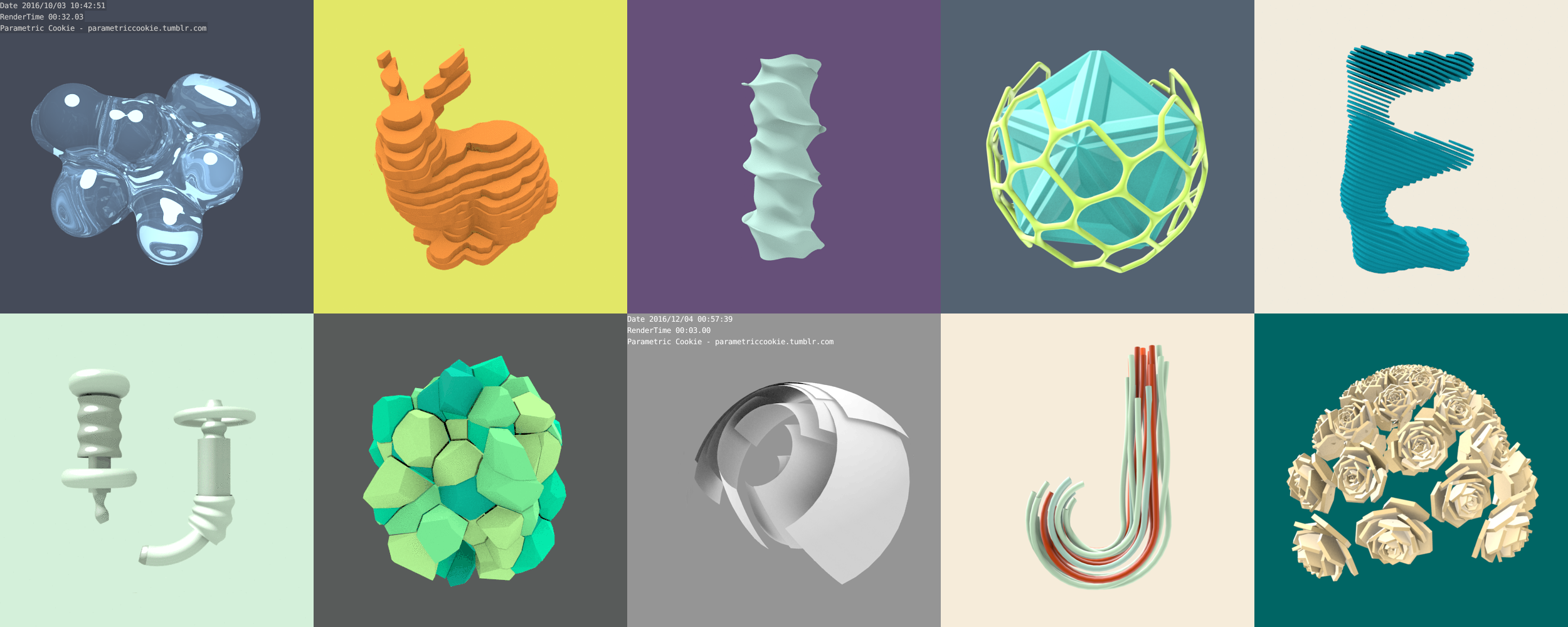This is a processing-style scripting add-on for Blender, which offers configurable Python scripting with Blender. You can run scripts in the background or within Blender and it offers various helper functions and classes to make quick and more involved sketches and animations. It is particularly useful for generative animations that are fully scripted with the Blender API. This add-on evolved from the various modules and functions used to create most of the pieces in the Parametric Cookie Collection.
Download the Cookie Factory Add-on from Github as an archive. Next, open Blender and go to File > User Preferences > Addons > Install from File and then choose the zip-archive and activate the flag besides the Cookie Factory Add-on.
There are a few examples to illustrate the functionality in the examples folder. You can run them by extracting the examples folder from the archive, selecting the config.json file in the file picker in the toolbar and pressing the Import / Reload button below. This loads the scene defined in the configuration file. Below the button you can choose which scripted scene to choose from (which are again located in the examples folder).
To start write your own script copy the simple_config.json to the folder your want your project to be in and change there the name in "scene": "minimal_cube" from minimal_cube to your python file in the folder without the extension. To run properly, import the core module and extend class Composition from core.scene.Scene as in the following example.
import core
from math import pi
PI, TAU = pi, 2*pi
class Composition(core.scene.Scene):
def setup(self):
# Create a simple scene with target, camera and sun
core.simple_scene((0, 0, 0), (-5, -13, 5), (-10, -10, 4))
# Create a cube object of size 5
self.obj = core.geometry.cube(size=5)You need to implement a setup(self) function which is called once. You can optionally implement a draw(self) function which is called for each frame change. This function can have the following form.
def draw(self):
# Set t to be in the range between 0 and 1
t = self.frame / self.frames
# Rotate the cube for one full rotation on two rotation axis
self.obj.rotation_euler = (0, t*TAU, t*TAU)There you can access the current frame with self.frame and the number of frames with self.frames. There are many more functions to choose from within the core module and you can also access the bpy and bmesh modules, besides all the available Python modules you would have within Blender.
You can run the code by loading the config file in Blender with the Cookie Factory Toolbox as previously shown or you can run it in the background by using the command
blender -b -a -- config.json
to render animations. In order to render single frames use the command
blender -b -f 1 -- config.json
When rendering animation or a single frame, the frames are rendered in the specified output_folder folder from the config.json and there the frames are rendered to a folder or an image with the name of the scene for animation and single frame render respectively. If you want the frames or the animation folder to be overwritten you can use the override option in the config.json.
This project uses the LGPL v3 for the code within the core folder and the code within the examples folder is licensed under the MIT license. The rest of the project is licensed under the GPL v3.

